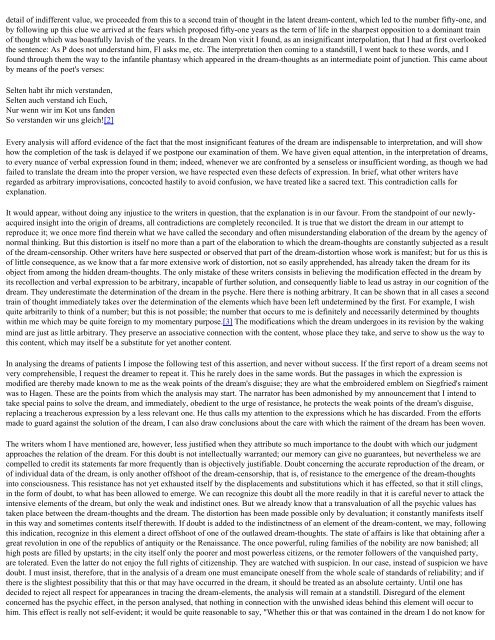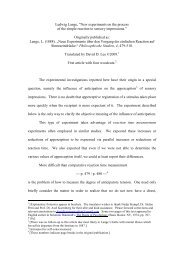The Interpretation Of Dreams Sigmund Freud (1900) PREFACE
The Interpretation Of Dreams Sigmund Freud (1900) PREFACE
The Interpretation Of Dreams Sigmund Freud (1900) PREFACE
You also want an ePaper? Increase the reach of your titles
YUMPU automatically turns print PDFs into web optimized ePapers that Google loves.
detail of indifferent value, we proceeded from this to a second train of thought in the latent dream-content, which led to the number fifty-one, and<br />
by following up this clue we arrived at the fears which proposed fifty-one years as the term of life in the sharpest opposition to a dominant train<br />
of thought which was boastfully lavish of the years. In the dream Non vixit I found, as an insignificant interpolation, that I had at first overlooked<br />
the sentence: As P does not understand him, Fl asks me, etc. <strong>The</strong> interpretation then coming to a standstill, I went back to these words, and I<br />
found through them the way to the infantile phantasy which appeared in the dream-thoughts as an intermediate point of junction. This came about<br />
by means of the poet's verses:<br />
Selten habt ihr mich verstanden,<br />
Selten auch verstand ich Euch,<br />
Nur wenn wir im Kot uns fanden<br />
So verstanden wir uns gleich![2]<br />
Every analysis will afford evidence of the fact that the most insignificant features of the dream are indispensable to interpretation, and will show<br />
how the completion of the task is delayed if we postpone our examination of them. We have given equal attention, in the interpretation of dreams,<br />
to every nuance of verbal expression found in them; indeed, whenever we are confronted by a senseless or insufficient wording, as though we had<br />
failed to translate the dream into the proper version, we have respected even these defects of expression. In brief, what other writers have<br />
regarded as arbitrary improvisations, concocted hastily to avoid confusion, we have treated like a sacred text. This contradiction calls for<br />
explanation.<br />
It would appear, without doing any injustice to the writers in question, that the explanation is in our favour. From the standpoint of our newlyacquired<br />
insight into the origin of dreams, all contradictions are completely reconciled. It is true that we distort the dream in our attempt to<br />
reproduce it; we once more find therein what we have called the secondary and often misunderstanding elaboration of the dream by the agency of<br />
normal thinking. But this distortion is itself no more than a part of the elaboration to which the dream-thoughts are constantly subjected as a result<br />
of the dream-censorship. Other writers have here suspected or observed that part of the dream-distortion whose work is manifest; but for us this is<br />
of little consequence, as we know that a far more extensive work of distortion, not so easily apprehended, has already taken the dream for its<br />
object from among the hidden dream-thoughts. <strong>The</strong> only mistake of these writers consists in believing the modification effected in the dream by<br />
its recollection and verbal expression to be arbitrary, incapable of further solution, and consequently liable to lead us astray in our cognition of the<br />
dream. <strong>The</strong>y underestimate the determination of the dream in the psyche. Here there is nothing arbitrary. It can be shown that in all cases a second<br />
train of thought immediately takes over the determination of the elements which have been left undetermined by the first. For example, I wish<br />
quite arbitrarily to think of a number; but this is not possible; the number that occurs to me is definitely and necessarily determined by thoughts<br />
within me which may be quite foreign to my momentary purpose.[3] <strong>The</strong> modifications which the dream undergoes in its revision by the waking<br />
mind are just as little arbitrary. <strong>The</strong>y preserve an associative connection with the content, whose place they take, and serve to show us the way to<br />
this content, which may itself be a substitute for yet another content.<br />
In analysing the dreams of patients I impose the following test of this assertion, and never without success. If the first report of a dream seems not<br />
very comprehensible, I request the dreamer to repeat it. This he rarely does in the same words. But the passages in which the expression is<br />
modified are thereby made known to me as the weak points of the dream's disguise; they are what the embroidered emblem on Siegfried's raiment<br />
was to Hagen. <strong>The</strong>se are the points from which the analysis may start. <strong>The</strong> narrator has been admonished by my announcement that I intend to<br />
take special pains to solve the dream, and immediately, obedient to the urge of resistance, he protects the weak points of the dream's disguise,<br />
replacing a treacherous expression by a less relevant one. He thus calls my attention to the expressions which he has discarded. From the efforts<br />
made to guard against the solution of the dream, I can also draw conclusions about the care with which the raiment of the dream has been woven.<br />
<strong>The</strong> writers whom I have mentioned are, however, less justified when they attribute so much importance to the doubt with which our judgment<br />
approaches the relation of the dream. For this doubt is not intellectually warranted; our memory can give no guarantees, but nevertheless we are<br />
compelled to credit its statements far more frequently than is objectively justifiable. Doubt concerning the accurate reproduction of the dream, or<br />
of individual data of the dream, is only another offshoot of the dream-censorship, that is, of resistance to the emergence of the dream-thoughts<br />
into consciousness. This resistance has not yet exhausted itself by the displacements and substitutions which it has effected, so that it still clings,<br />
in the form of doubt, to what has been allowed to emerge. We can recognize this doubt all the more readily in that it is careful never to attack the<br />
intensive elements of the dream, but only the weak and indistinct ones. But we already know that a transvaluation of all the psychic values has<br />
taken place between the dream-thoughts and the dream. <strong>The</strong> distortion has been made possible only by devaluation; it constantly manifests itself<br />
in this way and sometimes contents itself therewith. If doubt is added to the indistinctness of an element of the dream-content, we may, following<br />
this indication, recognize in this element a direct offshoot of one of the outlawed dream-thoughts. <strong>The</strong> state of affairs is like that obtaining after a<br />
great revolution in one of the republics of antiquity or the Renaissance. <strong>The</strong> once powerful, ruling families of the nobility are now banished; all<br />
high posts are filled by upstarts; in the city itself only the poorer and most powerless citizens, or the remoter followers of the vanquished party,<br />
are tolerated. Even the latter do not enjoy the full rights of citizenship. <strong>The</strong>y are watched with suspicion. In our case, instead of suspicion we have<br />
doubt. I must insist, therefore, that in the analysis of a dream one must emancipate oneself from the whole scale of standards of reliability; and if<br />
there is the slightest possibility that this or that may have occurred in the dream, it should be treated as an absolute certainty. Until one has<br />
decided to reject all respect for appearances in tracing the dream-elements, the analysis will remain at a standstill. Disregard of the element<br />
concerned has the psychic effect, in the person analysed, that nothing in connection with the unwished ideas behind this element will occur to<br />
him. This effect is really not self-evident; it would be quite reasonable to say, "Whether this or that was contained in the dream I do not know for



